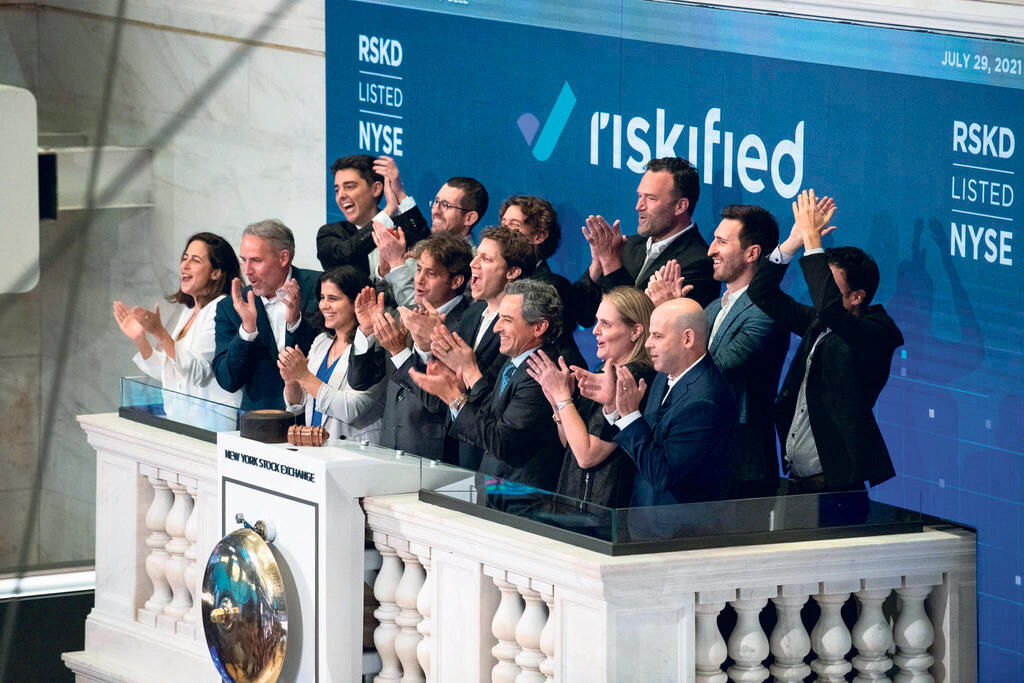
Top 50 startups list
Suddenly everyone wants to be a Soonicorn
The current reality is teaching everyone that before pushing a startup to become a unicorn, it must be taught to gallop, that is, to generate revenue and profits and be a business, not just a company. This new animal, which shows maturity and responsibility, even has an excellent name: Soonicorn, "Soon to be Unicorn"
In Calcalist’s 50 Promising Israeli Startups of 2021, we explained why every startup company dreams of being a unicorn, and how Israel has become a unicorn production line. Since then, more than $30 billion has flowed into the Israeli high-tech economy, new unicorns have been born, issued and reached the nightly news editions and even become the subject of a series of comedy sketches in Israel’s top satirical TV show "A Wonderful Land” (Eretz Nehederet). In other words, they have become the most unspecial thing around. So much so that a large number of the startups that have recently completed funding rounds have indicated that they have proactively and consciously decided not to become unicorns. Unicorn is so 2021, in 2022 everyone prefers to be a “soonicorn”.
What is a soonicorn? It's an animal that makes sounds similar to those of a unicorn, but behaves in a much less stressed way. Soonicorns are companies that completed their last round of funding at a value of about $600-800 million - which indicates that the product is already working and proven to be suitable for the market, sales are growing and the unit's economy is working, or is heading in the right direction.
Unit Economics is an index that is of much more interest to investors today than in 2021, and is intended to examine the company's chances of becoming profitable after reaching a certain sales target. Quite a few present and past unicorns, chiefly Uber who was one of the first symbols of the "unicorn industry", have never been able to prove that once investors' money stops flowing they will be able to sell the product or service and also profit from it. That is, they are also a functioning business and not just a company. Soonicorns, too, of course, have to meet all the expectations required of a unicorn, but may do so more slowly, without having to gallop. The goals are still ambitious, but to a reduced extent.
"I will make every effort so that we do not become a unicorn in the near future," one of the entrepreneurs told Calcalist. "We have already rejected offers for such value from investors. It only produces headlines and expectations, but there is no point in maximizing the valuation too quickly." Another entrepreneur agreed: "We do not want to become a unicorn, not before we reach $150-200 million in revenue," he said. A third entrepreneur concludes: "We are debating which investor to go with now to lead the round, because one of them wants it to be at a unicorn value and the other does not, and we are leaning towards the second one because we value them more as someone who can contribute to the strategic level of business development."
Thinking of an exit
What is behind the new mantra: "We do not want to be a unicorn"? Is it maturity and responsibility (which is surprising, I admit) on the part of entrepreneurs, who seem to be holding back investors who want to pour more money into their startups - or is it a consequence of the events of the last half year on Wall Street, and the waves that are starting to reach the private market? It's hard to say.
The first three months of 2022 were among the worst known to the IPO market in general, and the technology industry in particular. Only 18 new companies started trading and raised a meager amount together. On top of that, most of the unicorns issued during 2021, even those that did not do so through a merger with a SPAC, have become a sort of warning sign against going public. All of the Israeli companies that completed IPOs last year are already trading below their initial value, including excellent companies that continue to show growth and even profitability. Some have even fallen below $1 billion, as in the case of Riskified, SimilarWeb and Outbrain.
When the IPO market is essentially closed for business, it is clear that expectations need to be adjusted regarding the way forward. Herein lies the main reason for the reluctance to maximize value, even if investors may be willing to do so. The normal course of life of high-tech companies is based on reaching a certain income threshold based on the money of private investors. Only when the business stabilizes and becomes consistent at a level that allows for a reasonable level of forecasting, does the company become public, there, after all, awaits the really big money, despite the huge amounts of money that have entered the private investment market in the last decade.
The company's issuance also immediately produces a currency for it, in the form of a share through which other companies can be bought. As long as the IPO market was welcoming, even to unprofitable companies - and in the case of SPACs, also revenue-free - entrepreneurs tended to think that shortly after raising at a $1 billion valuation it would be possible to issue the company for $3-5 billion. This scenario is no longer relevant for most companies today, and it is doubtful that in the near future we will see such valuations for technology companies that are losing money. As a result, this exit strategy has been dropped for the time being, and entrepreneurs understand that they will be required to conduct another round or two of private fundraising and prefer to leave a margin of safety.
An alternative exit strategy for startups is to sell the company to a competitor, strategic partner or large customer. Here, too, valuation becomes a barrier, especially in light of the fact that those who buy companies worth more than half a billion dollars are mostly public companies, which do not have to put out the entire amount in cash, but pay some or all of it in shares. These companies, including Meta or Netflix, have also experienced declines in stocks, and even if they do not lack cash, they will not be in a hurry to make purchases at significantly higher revenue multipliers than those in which they themselves trade.
If there is a scenario that both entrepreneurs and investors want to avoid more than they aspire to achieve unicorn status, it is an exit at a lower value than the value at the last funding round. Even if at the financial level investment and venture capital funds know how to hedge this risk and guarantee themselves a return in almost any scenario, it is a significant image hit that no one wants on their resume.
The rate of acquisition of startups by public companies slowed from 150 companies in the first quarter of 2021 to 99 companies in the first three months of 2022, according to CB data. There is, however, still no change being felt in acquisitions made by private tech companies, with 124 acquisitions of startups being completed by privately owned high-tech companies in the first quarter of the year, compared with 118 such transactions in the corresponding period.
Avoiding too high a value is also related to another factor: the fierce competition for high-tech workers, which has characterized Israel in recent years. Both the United States and Europe are fighting for quality manpower, and for now there is no real evidence of a cooling in demand for high-tech workers. Many senior executives at Israeli technology companies have affirmed that wage levels have reached their limit, so the competition for workers is largely through capital rewards, i.e. options or blocked stocks.
Those who start working now at one of those public high-tech companies, whose shares have fallen by 80% without changing anything substantial in their business, get an opportunity for options at a much lower exercise price than those who came to the same company just six months ago. Because of this, for the private companies, in order to compete in this competition, it is better to settle for a low value, which allows for a greater potential for growth in valuation. A good example of this is the American food delivery company Instacart, which reduced its value from $39 billion to $24 billion without raising new funds, mainly to get back in the game of attracting employees. The company realized that the last value at which it raised was no longer relevant in the current reality, which means that it will not be possible to issue the company at a higher value, and certainly not to sell at such a value - and was prepared in advance by reducing the valuation for the purpose of allocating options.
Rare maturity, or preventive care?
An equally interesting question, which the entire technology industry has been asking itself in recent months, is how it is possible that the drama unfolding in tech stocks on Wall Street is not reaching the private market. While public companies have been slaughtered and lost 70%-80% of their value, private equity funds continue to inject billions to companies with similar profiles, only usually with worse business performance.
There is no lack of examples among Israeli companies either. Riskified fell below $1 billion while its arch-rival Forter, which is still estimated to have a lower revenue rate, is worth $3 billion. The fintech company Payoneer, among the first and most prominent Israeli unicorns, fell to a value of $1.4 billion, while private fintech companies like Tipalti or Melio are worth $8 billion and $4 billion, respectively.
Part of the answer lies in the fact that as long as a private company does not go out on a funding round, its value does not change, at least outwardly. Away from the spotlight, and in contrast to the noisy funding rounds, secondary deals are made by employees who want to get their hands on the money according to much more "realistic" valuations. Beyond that, there are beginning to be signs of a decline in the rate of investment and also in the rate of new unicorns. One of the prominent players in the Israeli high-tech arena described the situation as follows: "It's a bit like Waze telling you 'a traffic jam is starting to form down the road', while you are still zooming down the highway at 100 km /h on a road that seems wide open."
Where do you already see the traffic jam? First of all in IPOs or sales of companies. In the first three months of 2022, the value of the exits recorded by American venture capital funds and tech investments amounted to $33 billion. Although the number sounds high, it is an 82% dip compared to the previous quarter, PitchBook revealed. These are still exits similar to those recorded in 2018 and 2019, which were considered good years on any scale - except that three consecutive quarters in 2021, each with exits worth close to $200 billion, distorted the scale.
The production rate of unicorns has also slowed down worldwide, but here too this may turn out to just be a blip and visible only if compared to previous periods. In March, 34 new unicorns were born in the world, compared to 49 in February and 46 in January. Precisely because of the lack of IPOs and exits, the number of private companies with a value of more than $1 billion has increased, and today there are no less than 1,260 such companies on the CB Insights watch list, with a combined value of $4.3 trillion.
By the way, even in CB Insights, which is considered the oracle when it comes to monitoring what is happening in high-tech, more emphasis has recently been placed on companies that are "almost there" - after all, they are the new soonicorns, the new darlings.
Unicorns have become a slightly rarer animal in recent months. If last year 44% of the money went to funding companies worth more than $1 billion, then since the beginning of the year the funding rate has dropped to 30%. Last March, unicorns raised $14 billion together, similar to the $15 billion raised in February, but still far behind the $26 billion raised in March 2021.
Between Island and Fast
Despite the slowdown, these are still phenomenal numbers. Even in the current reality, startups are receiving valuations that seem disconnected from reality - for example, that of Island, serial entrepreneur Dan Amiga's cyber company, which raised $115 million at a value of $1.3 billion just weeks after completing its first funding round to the tune of $100 million.
The reason “the factory continues to work” lies in the unprecedented amounts of money that still sit in the funds of the investment funds and continue to flow into them. In the first quarter, venture capital funds in the United States raised $70 billion, an amount disproportionate even compared to 2021, as it already accounts for more than half of everything raised that year, which was a historic record year.
This may be due to fears that the rest of the year will be worse, and a desire to secure the capital available for investment as long as the world is not in recession. One notable example of this, and the one that is actually responsible for this record figure, is Insight Partners, the most active fund in Israel, which recently completed a $20 billion fundraising for its new fund - bringing its total assets under management to $90 billion. Tiger Global, which has also become a major player in Israeli high-tech investments in the past two years, closed $12.7 billion for its new growth fund about a month ago. Andreessen Horowitz, another giant high-tech investment fund, raised $9 billion earlier this year.
Quite a few Israeli funds also joined the party, including Vertex with two $400 million funds; Glilot Capital, which specializes in cyber, with $220 million; Dov Moran’s Grove Ventures, which focuses on deep technologies, with $185 million, StageOne Ventures with $150 million; and Gili's Raanan’s Cyberstarts with $200 million. In other words, within a few months, and at a time when a storm is raging on Wall Street, Israeli funds have raised more than a billion dollars - while some of the billions of foreign funds are also earmarked for the startup nation.
All the players understand that these huge sums will have to be invested, but the VCs may do so at a slower pace and require more shares for the investment from the developers for the same amount, resulting in a drop in value levels. Still, with $129 billion raised in 2021 and tens of billions still left from previous years, the common calculation in today's market is that there is enough money to support the industry for a period of about three years, even if those are particularly difficult years.
What will probably change is what the funds will demand for this money - not just at the basic level of holdings or value, but down to the smaller print. If in the last two or three years we have seen a market of entrepreneurs, in which clauses that protect the funds and give them privileges and protections in any scenario have almost disappeared, these days the wheel is starting to turn in the other direction. Thus, for example, investors in the later stages, who have now become more risky in the face of the blurred exit horizon, will have the right to receive their returns before the early investors. At the same time, more "expansion rounds" will emerge, i.e. recruitment at the same value as in the previous round - without a jump in value twice a year, which has become a kind of new normal in recent years.
Most of all, however, the change will be in the depth of the tests and requirements from the companies, as is already beginning to be seen on the ground. The large funds, of the Tiger Global type, which until recently poured money into Israeli companies with almost no due diligence, are changing their course of action. They are now seeking to make more deals with the Israeli funds that are known for more in-depth scrutiny.
The deepest change of all that is happening these days, and leads back to the caution that the companies themselves prefer to take, is the expectation to present something more real than promises. The first event in this regard, and probably not the last, is the noise-making story of the Australian fintech company Fast, which managed to raise more than $100 million in two quick rounds since its inception in 2019. The company, whose investors included Index Ventures and the fintech giant Stripe, made a lot of noise and threw grand parties, recruiting 400 employees in one year and burning $10 million a month. So far the story sounds familiar - except that when it came to raising additional capital from investors, this time already at a value of $1 billion, they discovered that its entire revenue last year totaled $600,000 and they turned off the tap. In early April, after not finding a buyer, Fast closed.















